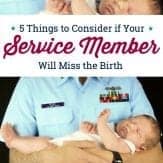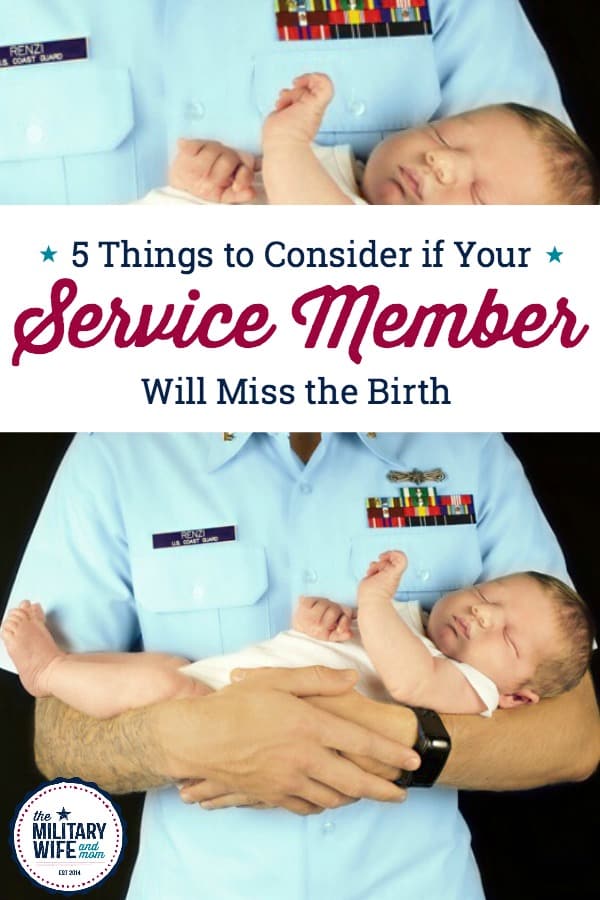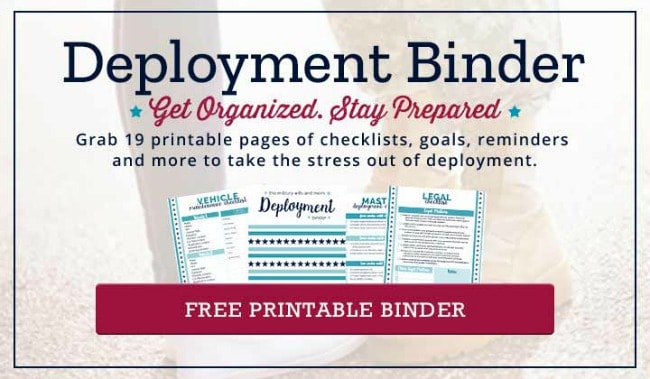Inside: What do you do if your service member will miss the birth of the baby? Learn 5 important things to remember. This is a sponsored post with The Breastfeeding Shop. All opinions are my own.
Military family emergency leave is available for family emergencies. However, the Department of Defense does not consider giving birth to be an emergency unless your life or the life of the baby is suddenly in danger. Yikes!
Ultimately, the decision about whether or not a service member can return home for the birth of a child relies solely upon his or her commander.
In most situations, military family emergency leave is only available if an immediate family member (e.g. mother, father, wife, child or sibling) dies or is seriously injured or has another type of major medical emergency.
What do you do if your service member is away for the birth?
There are five important things to keep in mind if your service member won’t be physically present during the birth of your child.
Related: 13 Amazing Pre-Deployment Gift Ideas That Your Service Member Will Love
And of course, there are situations when a service member leaves on an unexpected deployment or they can’t get home on their originally scheduled date, leaving you without your spouse on a very important day.
Giving birth without your service member is something to consider regardless if you think he or she will be home or deployed. Because you never know.
1. Make delivery plans.
Consider hiring a doula to help you through the birth regardless if your service member plans to be present or not. This gives you a back up plan in the unexpected event he or she leaves on short notice.
Another option would be to fly out a friend or family member for the birth. The big challenge with this option is that the window for having birth is sometimes a month long. You may deliver two weeks early or two weeks late. That’s a big window! It is especially troublesome if you go into labor early and don’t have any support.
The third option would be to fly home and temporarily live near family while your spouse is deployed. If you have other children this is not always an option. Do what works best for you!
2. Hire additional support to help you.
There is a saying that military spouses will wait for the house to burn down before asking for help. Time to throw away all the shame and ask for help before you need it.
- Hire and schedule a cleaning lady to come after the birth.
- Hire and schedule a meal delivery service after the birth.
- Reach out to your community, church and circle of friends and see if anyone would be willing to help you with a meal train.
It takes a lot of courage to ask for help, and a lot of wisdom not to wait for the house to burn down first. If you’re struggling with money for these services, ask for them in lieu of baby gifts or shower gifts.
3. Utilize free classes and resources to prepare.
The military offers a wide range of free classes to prepare for a new baby. One of my favorites is Budget for Baby that is put together by the Navy and Marine Corps Relief Society.
You can also learn about the new parent support program, which offers a variety of resources including home visits to military spouses. You can find one nearest you using the Military Installations Locator and select New Parent Support Program from the drop-down menu of programs and services.
For breast pumps through TRICARE, check out The Breastfeeding Shop. They will help you get a prescription from your doctor, help you determine which pump is best for you, and make sure it all gets delivered straight to your doorstep. Plus, they take care of all the paperwork with TRICARE.
- How to get a breast pump through TRICARE for $0.
- Breast pump comparison chart: How to choose one that is right for you.
- 21 things that may happen if you’re having a baby with a service member.
4. Create a communication plan for during the birth.
Talk about how you’d like to communicate during the birth. Will you send an email letting your service member know you’re in labor? And from there he or she will Skype or FaceTime you?
The answer truly depends on your service member’s deployment situation. When you go into labor he or she may be out on a training mission. So just in case, you’ll also want to know how to send a Red Cross Message.
5. Make sure you have a Power of Attorney.
After the baby is born, you’ll want to get him or her into the DEERS system right away (this is your gateway to TRICARE coverage for your baby). In order to complete that process you’ll need a power of attorney.
You can call your base legal office for more details about special power of attorney vs. general power of attorney. They will help you get an appointment and the proper documents set up free of charge.
What would you add? If you’re having a baby while your service member is away, what is one thing you’d be sure to do?
Want more on military life?
- 9 Relationship Truths Only a Military Spouse Would Understand
- Why Deployment Meltdowns Are Actually a Good Thing
- The Real Reason Being a Military Wife Is So Hard
- Why I Didn’t “Go Home” During The Deployment








Oh my goodness! Thank you for this list of encouraging advice! I left a comment on another of your posts (which was also great) concerning this specific question!
My husband and I have been married a little under a year (September 2018), and we have begun talking about starting a family! 🙂 Sadly, there are plenty of horror stories to go around, but your words did bring a sense of peace. Thank you! I’m definitely worried about moving mid-pregnancy or right before the due date. Have you ever been in that situation? How do you properly plan for birth when you don’t know the military schedule for restationing? (We are currently in flight school and the timeline of when we’ll be moving on is so far from known!)